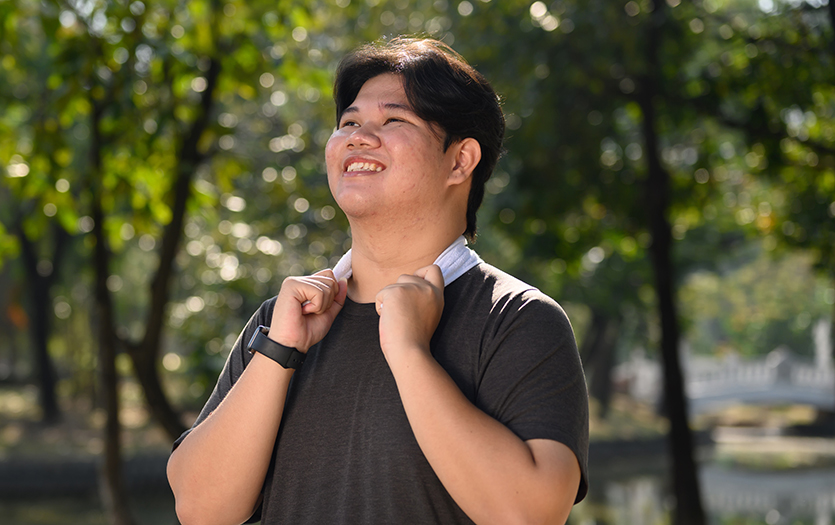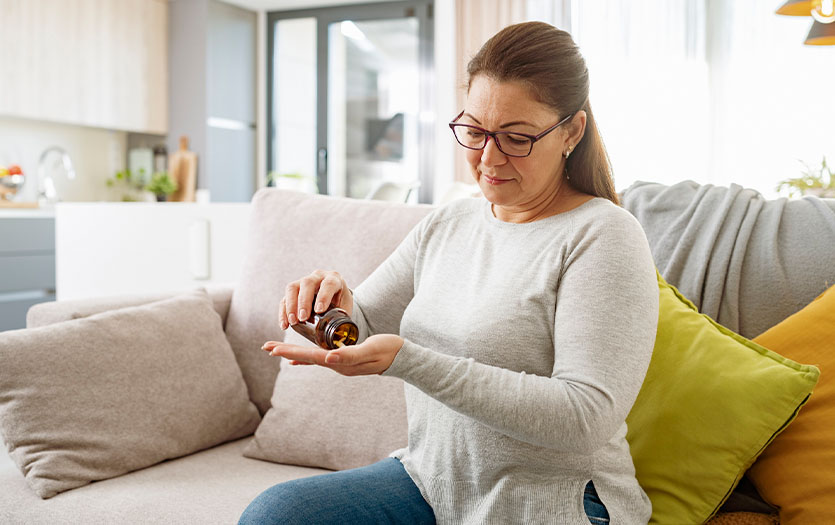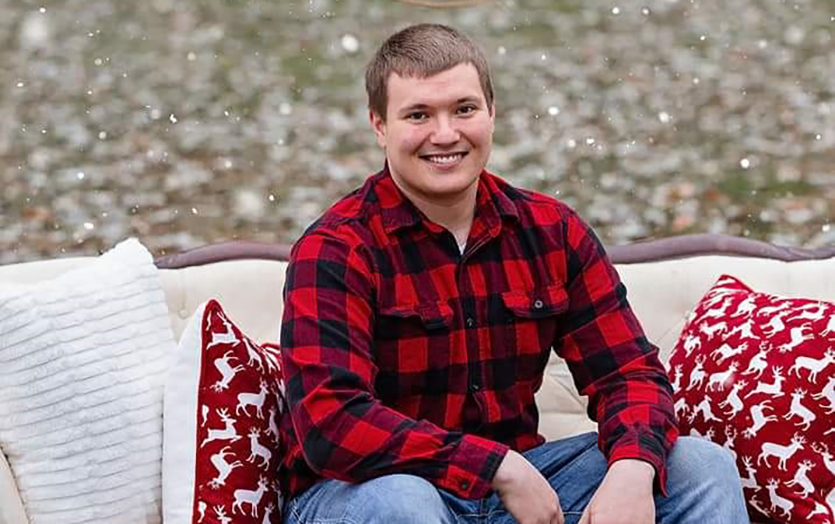
This post contains potentially distressing content related to suicide. To learn more about resources and prevention through Parkview Behavioral Health Institute, visit us here.
On a summer morning in 2020, the Moor family’s lives changed forever. And, because of a beautiful final act of generosity, a grandfather from Michigan was given more time.
To mark Donate Life Month, Dena Moor, CMA, prior authorization specialist, Pain Management, Parkview Bryan Hospital, the mother of Ivan Moor, and Jeff Skrzyniarz, organ recipient, share a powerful testimonial of the tragedy that connected them forever.
June 1, 2020 – Ivan
When COVID was at its height, Ivan really struggled with depression. I woke up that morning to his dog jumping in my bed. I texted him, joking, “What's your beast doing running around my house?”
He sent me a message back that said, "Mom I love you, I'm really sorry. How do you tell the woman who gave you life that you can't live yours anymore? Please take care of Courage. If I hear your voice I can't do what I need to do."
He'd said scary things before, but this was different. He bought a house two blocks from ours, and I can stand on my front porch and see Ivan's front porch. I heard sirens in the distance. I ran over to his house, but the door was locked. I tried my keys, but they weren’t working. I started knocking. The sirens got louder. I couldn’t get in. My husband was on his way.
Every parent thinks, if something is going on, I’ll move a mountain to get to my child, but I couldn’t get to him. I couldn’t get through the steel door. And then, I heard a gunshot, and I knew.
My husband arrived, then the fire department and ambulance pulled up. I told them to break down the door. We grew up in Montpelier and it’s a small town, so we knew all of the officers and first responders. They stopped me and told me I couldn’t go into the house. He had shot himself, but he was still breathing on his own.
They took Ivan to [now] Parkview Montpelier Hospital and then flew him to St. Vincent Medical Center in Toledo. We drove there and, because of COVID protocols, it was unclear who would be able to go into his room. Eventually, we were both able to be with him. We learned it was a self-inflicted gunshot wound to the head, behind his ear. Because of the medications they’d given him, they couldn’t declare him braindead. He was on life support, and they asked us if we had any interest in them looking into whether Ivan could be an organ donor. Without hesitation, we said absolutely.
When Ivan was 15, I took him to get a moped permit. When I looked at it, I said, “Buddy, you didn't sign up to be an organ donor.” He told me that he didn’t want someone calling him up, demanding his kidney. I realized we hadn’t talked to our kids about the process. No parent wants to talk about death and dying–it’s scary! But we sat all of our kids down and explained it. When it came time to get his driver’s license, he came home super proud, because not only was he wearing his jazz band bowtie and vest in the photo, but he was also an organ donor.
When they handed us his bags of belongings, we pulled out his wallet and looked at his driver’s license, but we couldn’t find the red heart. But we knew our son and how he was. Ivan was the type that if he had it and someone needed it, he would give it to them. It came back that he was registered as an organ donor. They just got rid of the nice big red heart.
In that moment, I got a little relief knowing that something good was going to come from this.
2000-2015 – Jeff
I had my first of four heart attacks while doing a 6k obstacle race with my son in Kensington Metropark. We were on the first hill, and I felt something in my chest. I couldn’t keep running, but I walked the course and completed every obstacle. We were 50 yards from the finish line, and I had to stop on a bench for a minute. As soon as I sat down, I told my son, “I think I’m having a heart attack.” Then I collapsed into him.
He began chest compressions and, when he looked over, there was a Novi EMT crew right there. He yelled and they put me in the ambulance. They zapped my heart back into rhythm. The technician told me I’d been out for about 45 seconds, and they took me to a hospital in Novi. The physician there implanted a defibrillator under my skin with a wire leading to my heart. I was told it would zap me back into rhythm if needed, and that I would never have another heart attack.
I lived with that defibrillator for about five years. I’d go to the hospital every six months or so and have it checked. The battery was looking good, I had no problems. I was back to work and going to the gym.
In January 2015, I had a checkup at Beaumont Health, and they did x-rays and tests. It came back that I had five significantly clogged arteries around my heart. They recommended a triple bypass. January 28, 2015, was my last day of work before the surgery.
Winter-spring 2020 – Jeff
I noticed I had fluid building up in my arms, legs and feet. I couldn’t get my tennis shoes on. My cardiologist put me on medication and explained that my heart and kidneys were constantly fighting to get rid of the excess water.
My primary care provider ordered bloodwork and, when my results came in a day later, they called and told me to stop taking the heart medication immediately. They were concerned about my kidneys. As soon as I stopped, the swelling got worse. My cardiologist admitted me to Beaumont Health to figure out next steps.
Early one morning, the heels on both of my feet started to feel like someone was pounding on them with a hammer. I was in so much pain. At 2:30 a.m. a nurse came in and told me it looked like something was glitching with my heart on the monitor. She contacted the cardiologist and gave me something for the pain.
The next morning, they unplugged the IV and I got up to go to the bathroom. As soon as I put two feet on the floor I collapsed. I woke up surrounded by nurses. They told me I’d had a heart attack (No. 2) and they rushed me to the ICU.
It turned out, my defibrillator had been set to 190 beats per minute. I would have had to run two marathons to trigger a shock! I got a Swan-Ganz catheter in my neck to measure the pressure and thickness of my heart, and an Impella heart pump in my right leg to keep blood flowing to my other organs since my heart was barely pumping.
We were already talking about a heart transplant at that point, and Henry Ford Hospital in downtown Detroit was one of two options in Michigan that could do it. When I got there, they put me in isolation. The three main heart doctors kept talking to me about an LVAD, which is an electrical pump. At that point, I was No. 5 on the transplant list. There are so many things that have to go right to match with a donor, but I was only 59 years old. I was pretty active. I wanted to travel and swim and play golf, not be confined to this battery bag around my waist for the rest of my life.
I finally told the doctor, I have a bad heart, like a bad motor. You want to put a turbocharger on me to keep me running but even with that power, the engine would still be bad at the end of the day. I was going to wait for the heart transplant.
I started going through all of the precautions to prevent an infection, which would impact my ability to get or have a successful transplant. Part of that, was moving the Swan-Ganz in my neck from the right side to the left. After the surgery to switch it, the nurse was transferring me back into my bed and a red light started flashing on the monitor controlling my Impella. It wasn’t working. Suddenly, like someone lit a firecracker under my bed, I lifted about four inches up into the air. It was my defibrillator. My heart was failing, and I’d had a third heart attack.
They took me back to the OR, where I’d just been. Just as they were getting me off the gurney in the ice cold OR, another boom! My fourth heart attack. I heard the surgeon say, “We gotta go, guys.” They put the mask over my face and I fell asleep.
When I woke up the next morning, I just stared at the ceiling tiles. Having four heart attacks really improves your communication with the big guy, and I just kept asking why he hadn’t taken me. There must be a purpose.
I had three IVs in me, a kidney dialysis machine, tubes in my lower abdomen and a new Impella pump. I was on oxygen. So, I was surprised when the doctor came in and told me I was improving. But that wasn’t what he meant. I was now No. 1 on the transplant list. They were searching high and low for a heart for me.
June 2-3, 2020 – Ivan
Ivan was declared braindead on June 2. I call that time the terrible, horrible, no-good very bad days. It was so emotional watching our son lying there, going through the motions. They started trying to make matches. Our kids all came up to see him, except our youngest, who was three at the time. They opened a conference room for us and allowed friends and family to come and say goodbye. There were probably 25-30 people who came through.
June 3, 2020 – Jeff
They told me they found a heart. I had accepted that whatever was going to happen, would happen. My grandson, my first grandchild, had just turned one and I got a chance to talk to him on the phone. He said “Hi, dziadek” (polish for grandfather) and they were the sweetest words I’d ever heard. I just prayed for the best outcome. I had a great team at Henry Ford. I’d been through four events where God could have taken me, and I had to accept that there was a reason he didn’t. Why I got Ivan’s heart.
June 4, 2020 – Ivan
We had an honor walk for Ivan. I couldn't believe the support, the encouragement and the tears from the doctors and nurses who came and stood in the hallway with us.
Just before the walk, I’d gone downstairs to breathe for a second and saw they were having a blood drive, so I donated. When I got on the elevator, a doctor said, “Aren’t you Mrs. Moor? Ivan’s mom?” I told him I was. He said, “I'm the doctor who's going to do his organ procurement. They're getting ready to prep your son. I can't believe you're doing this.” I explained that my son was A+ and so was I. That the person getting his organs might need blood. Why wouldn’t I help? He hugged me and told me our family was beautiful. I took the interaction as a sign we were doing the right thing.
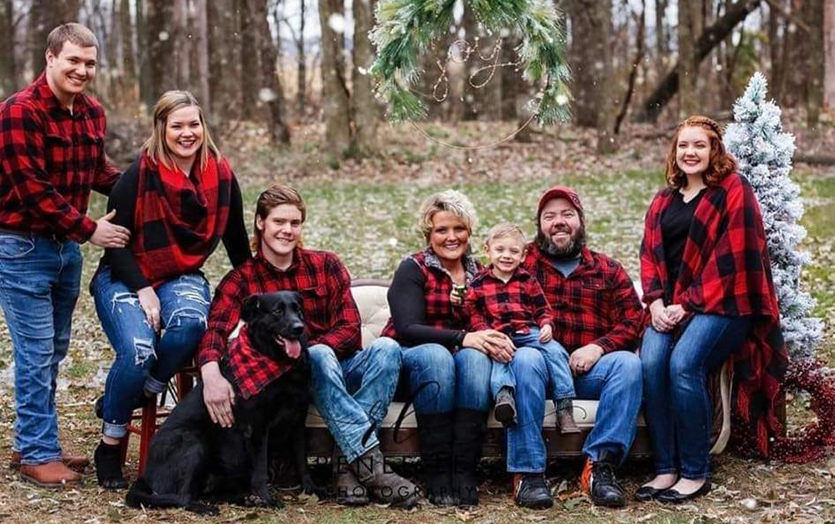
We walked down with Ivan. They put us in a pre-op room, and we gave him hugs. We told him that we loved him. How proud we were of him. That he was going to make such a difference to so many people. Then we let him go and become a hero.
The hardest drive was the one home from the hospital, knowing he was in the OR. Six hours later, I got a call that the surgeries went wonderfully. All of the organs had been procured and transported.
June 5 – Jeff
My new heart was placed on June 5. When I met with the surgeon after, he told me that the heart I received was perfect. It fit right in. All of the machines were gone.
I spent 77 straight days in the hospital. I’d entered Beaumont on May 5 of that year and didn’t leave Henry Ford until September. I had to come back several times for plasmapheresis and biopsies to make sure everything was going well with the heart and my body didn’t reject it. But the heart was and is fantastic.
Toward the end of my stay, they gave me materials about communicating with your donor’s family, and oh my gosh, I jumped at it. It took some time since both sides had to come to an agreement, but four months later, Dena got ahold of my email address and contacted me. I answered back. The initial emails were short. Mine were filled with a thousand “thank yous.” What can you say? If it weren’t for them, for their son, I wouldn’t be here.
Eventually, we swapped phone numbers. I talked to Dena and her husband, Mike. When we talk, I tell them I’m doing great, everything looks good.
Dena sent me a three-page letter and picture of Ivan, and he was such a handsome young man! I told her that he shouldn't be gone. I can't fully understand or explain what happened to him. All I can say is that I'm grateful, but I'm not, because they lost a loved one and I gained another chance at life. So now I can be with my family, but they’re missing a part of theirs.
After – Ivan
We eventually got letters from the recipients of Ivan’s heart, lungs and liver. They were able to use his kidneys for research.
We grew to be closely connected with Jeff. He is such an amazing person. I regularly check in with him and tell him “Happy Heart-a-versary” every year. He tells me he knows my son’s heart is beating so strong and he's so thankful and he tries to take good care of it. He has new grandbabies in his life thanks to Ivan.
He came and surprised my daughter Stacie on her wedding day and let her listen to her big brother's heart. It was the first time we’d met him, and it was so beautiful. He welcomed everyone with open arms–anyone who needed a hug or wanted to listen, he was willing.
After – Jeff
I learned that Ivan was incredibly close with his sister, and I thought, one body, one mind. She was getting married in September 2021, and Dena asked if I would mind coming to surprise her.
I was more than happy to. I stayed in my car until the wedding party had walked down. I sat with Ivan’s aunt and grandfather. I had a whole story made up about who I was!
After the vows and speeches, Dena got up and grabbed the microphone and told her daughter there was somebody who she should meet. I went up and pulled a stethoscope out of my pocket. I introduced myself and said, “If it wasn’t for your brother, I wouldn’t be here. You may have lost your brother physically, but emotionally, I’m here. I’m here anytime you want. You haven’t lost Ivan. He’s lives in me, and I want you to listen to him.” She put the stethoscope to my chest and my heart started pounding. I told her, “Tell your brother to stop running!”
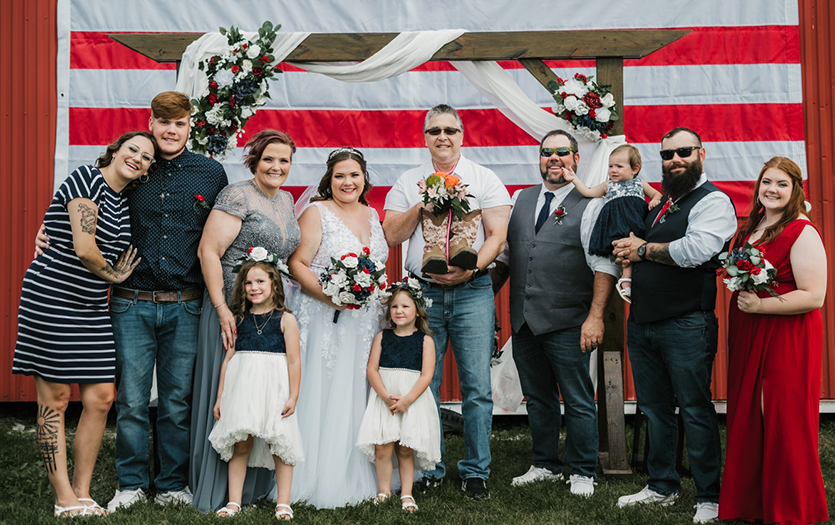
Everybody got a chance to listen to the heart. Before I left, I gave Dena a big hug.
Today – Dena
Ivan was 22 when he left us. He had this smile that lit up the world.
When we're gone, our names are put in some stone and for so long, people remember us but eventually we get forgotten. But with Ivan, telling his story is a way to talk about suicide awareness and organ and blood donation. It keeps his legacy going.
People label suicide as cowardly or selfish, and I get it. I’ve been through every emotion. I’ve bonded with and talked to so many people who have gone through what we did. It’s the worst club to be a part of. It’s also a good reminder that you just don’t know what someone’s going through. If you can share a little kindness, a smile, maybe that's all that person needs that day.
Last June, we started a new tradition. We bought 300 miniature rubber ducks and wrote a word or phrase on each to encourage others. We tucked them around the local hospital for people to find. We got the idea when we were at the hospital with Ivan and I found my first duck. We’ll do it every June, to raise awareness.
It’s the puddle in a pond. Actions create all these ripples that flow out. You never know where they’re going to end and who they’ll touch. It’s like that with organ donation. You don’t realize how many people you can help through that one generous act.
Some days I can hardly breathe when I say his name. Other times I can get through the whole story. But sharing his journey is my way to honor and remember him. It's for him. If I can help one person to lose that stigma and get help, it’s worth it. If you think that ending your life is the answer. If you think your loved ones will get over it, you’re wrong. Your mom will cry every day until the day she's gone.
Ivan passed in June, and I took a job in October at Parkview Bryan, in the ICU. Four months after he was gone, I was listening to ventilators in rooms with COVID patients. Then I signed up to help people on suicide watch in the ER. I never want anyone to think that nobody cares. I couldn’t save my baby, but maybe I can help somebody else's. It's a tough world and we all have to look for each other.
Seven months ago, my oldest daughter had our first grandson, and she named him Ivan. It’s such a wonderful tribute.
Today – Jeff
I like to tell people that I’m 65, but really 43. (I have the heart of a 22-year-old, so it knocks off a few years.) My cardiologist only wants to see me once a year. I still get bloodwork every three months, but the numbers look great.
I am a 100% success story. For anyone considering becoming an organ donor, know that you will save people’s memories, their time with their family and the opportunity to experience life. In today's world, where everybody seems to hate everybody, it’s incredible to have someone come along and embrace the fact that they lost somebody but saved somebody in the same sentence.
You don't expect it, but sometimes you get a miracle. Ivan's heart is my miracle. Dena and Mike adopted me into their family. I have to believe there’s a reason I received Ivan's heart. I have three more grandchildren now, and I’m so thankful I get to see them.
.jpeg)
Resources
If you’ve lost someone to mental illness, learn more about our support services here. If you are experiencing a mental health crisis, help is available. Call the Parkview Behavioral Health HelpLine at 260-471-9440 or 800-284-8439 anytime, 24 hours a day. Experienced specialists are available to guide you to the appropriate level of care - or resources - for your situation.
Visit organdonor.gov to learn more about how you can become a hero and sign up to be an organ donor.

